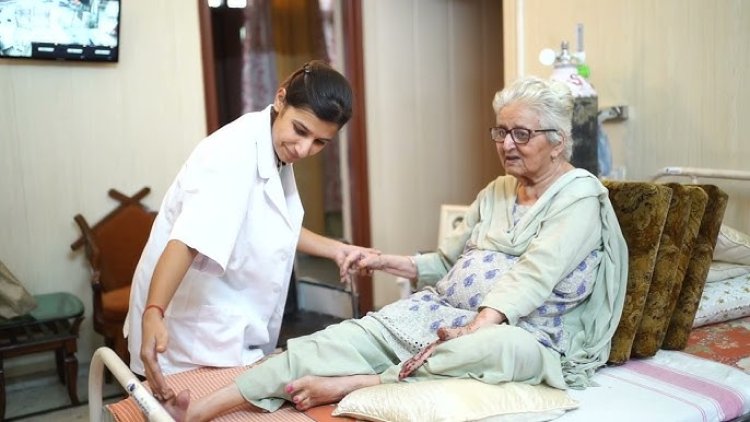Caretaker vs. Caregiver Myths: Understanding Home Care Services
Debunk common misconceptions about caretakers and caregivers. Learn the reality of their roles in home care services in Mohali & Chandigarh, and how VCare@Home clarifies these services.

The world of home care services is built on trust and understanding. Yet, despite the growing need for professional support within the home, several misconceptions often cloud the public’s perception of the roles of caretakers and caregivers. These misunderstandings can lead to unmet expectations, confusion about services, and ultimately, a less-than-ideal care experience for both the recipient and their family. Whether you’re seeking home care services in Mohali or exploring options in home care services in Chandigarh, clarifying these common myths is essential. It ensures that families can accurately assess their needs, understand the scope of services offered, and make informed decisions when selecting the right professional. In this comprehensive guide, we aim to debunk these prevalent myths, shedding light on the true nature of caretaker and caregiver roles, and highlighting how reputable services like VCare@Home provide clarity and excellence in home care services.
Myth #1: Caretaker and Caregiver Mean Exactly the Same Thing
This is perhaps the most pervasive misconception. While the terms are often used interchangeably in casual conversation, they can signify different focuses and skill sets, especially within professional home care services.
-
The Reality:
- Caretaker: Typically focuses on the domestic and environmental aspects of support. This includes household management, light housekeeping, meal preparation, errands, and companionship. Their primary goal is to maintain a safe, comfortable, and well-managed living environment.
- Caregiver: Generally focuses on the personal and health-related needs of the individual. This involves assistance with Activities of Daily Living (ADLs) like bathing, dressing, toileting, mobility, and often medication reminders or administration (depending on qualifications). They may also monitor health and support recovery or management of chronic conditions.
-
Why it Matters: Understanding this distinction helps clients accurately define their needs. If the primary requirement is help with household chores and social interaction, a caretaker might be sufficient. If personal hygiene assistance or health monitoring is needed, a caregiver with specialized training is essential. Many professionals working for home care services in Chandigarh and Mohali are trained to perform both sets of duties, but knowing the difference helps in specifying your needs.
Myth #2: Caregivers Are Just Companions
Another common misunderstanding is that caregivers are solely there for companionship, offering little more than social interaction.
-
The Reality:
- While companionship is a vital component of caregiving, it is usually one facet of a broader role. A caregiver’s duties often extend to essential personal care and health support that go far beyond mere company.
- They are trained to assist with ADLs, recognize changes in health, provide emotional support during difficult times, and sometimes even assist with therapeutic exercises or specific medical protocols under supervision.
-
Why it Matters: This misconception can lead families to underestimate the skills and responsibilities of a caregiver, potentially leading to inappropriate service requests or an underestimation of the care recipient’s needs. Recognizing the medical and personal assistance aspect is crucial for receiving appropriate support.
Myth #3: Caretakers and Caregivers Don’t Need Formal Training
Some believe that anyone willing to help around the house or provide companionship is qualified, overlooking the importance of formal training and qualifications.
-
The Reality:
- While a caring attitude is fundamental, formal training equips professionals with essential skills for safety, hygiene, emergency response, and effective assistance.
- Caregivers, in particular, often require certifications such as Certified Nursing Assistant (CNA) or Home Health Aide (HHA), which involve comprehensive training in personal care, health monitoring, and safety protocols.
- Even for roles leaning more towards caretaker duties, training in basic first aid, CPR, and household safety can significantly enhance the quality and safety of the service. Reputable home care services invest in rigorous training for their staff.
-
Why it Matters: Untrained individuals may lack the knowledge to handle emergencies, perform personal care tasks safely, or recognize signs of deteriorating health, potentially putting the care recipient at risk.
Myth #4: All Home Care Services Are the Same
Clients might assume that all agencies offering home care services operate with the same standards, qualifications, and quality of care.
-
The Reality:
- The quality and scope of services can vary significantly between agencies. Factors such as their hiring and screening processes, the level of training provided to their staff, their supervision protocols, and their commitment to personalized care differ greatly.
- Some agencies may focus more on basic companionship, while others offer comprehensive skilled nursing and complex personal care. VCare@Home aims to provide high-quality, personalized home care services in Mohali and Chandigarh by focusing on trained professionals and tailored care plans.
-
Why it Matters: It’s crucial for families to research and vet agencies, asking specific questions about their hiring practices, training programs, and how they match clients with professionals to ensure they align with their specific needs and quality expectations.
Myth #5: Caretakers/Caregivers are Always Available 24/7
Another misconception is that a caretaker or caregiver is essentially on-call at all times once hired.
-
The Reality:
- Professional caretakers and caregivers work scheduled shifts. While some home care services offer 24/7 care with rotating staff, it’s not an inherent expectation for every individual hired.
- Agencies have specific policies regarding working hours, overtime, and emergency response. It’s important to clarify these arrangements upfront.
-
Why it Matters: Families need to understand the service hours and emergency protocols to ensure continuous support if needed and to avoid expecting round-the-clock availability that isn’t contracted or feasible.
Myth #6: Hiring Directly is Always Cheaper and Better
Some may believe that hiring an individual directly, cutting out an agency, is a more cost-effective and personal approach.
-
The Reality:
- While direct hiring might seem cheaper initially, it shifts the burden of vetting, background checks, training, tax management, insurance, and managing potential liabilities entirely onto the client.
- Agencies like VCare@Home handle these complexities, providing peace of mind and ensuring that caregivers are qualified, insured, and supervised. The cost of an agency often reflects these comprehensive services and safeguards.
-
Why it Matters: The hidden costs and responsibilities of direct hiring can outweigh the perceived savings. Relying on a reputable agency ensures a more secure and professionally managed care arrangement.
Conclusion: Clarity for Better Home Care Choices
Navigating the landscape of home care services becomes significantly smoother when the common misconceptions surrounding caretakers and caregivers are addressed. Understanding that these roles, while sometimes overlapping, have distinct focuses – with caretakers emphasizing environmental and domestic support, and caregivers focusing on personal and health needs – allows families to articulate their requirements more precisely. Dispelling myths about the need for formal training, the uniformity of agencies, and the expectation of constant availability ensures that clients enter into service agreements with realistic expectations and a clear understanding of the support they will receive. By clarifying these roles and debunking common myths, individuals and families can make more informed choices when seeking home care services in Mohali and home care services in Chandigarh. Services like VCare@Home strive to provide transparency and excellence, offering professionals who are not only skilled but also well-understood, ensuring the highest quality of home care services for loved ones.
Frequently Asked Questions (FAQs)
1. If I need help with both housekeeping and personal care, can I find one person?
Yes, many professionals working for home care services are trained to offer both caretaker and caregiver duties. Agencies like VCare@Home can often provide versatile individuals who can manage household tasks, provide companionship, and assist with personal care needs. It’s about clearly communicating your combined needs to the agency.
2. Are all caregivers trained in basic medical assistance like medication reminders?
While many caregivers are trained to provide medication reminders, the extent of medical assistance they can offer varies by their qualifications and your location’s regulations. Some may be trained to administer certain medications, while others are strictly limited to reminders. Always confirm the specific training and scope of practice with the agency.
3. How does an agency like VCare@Home ensure their professionals are qualified and reliable?
Reputable agencies implement rigorous screening processes, including background checks and reference verification. They also provide comprehensive training, ongoing professional development, and supervision. This ensures that their professionals meet high standards of skill, reliability, and ethical conduct, making them dependable for home care services.
4. What is the main difference in focus between a caretaker and a caregiver?
The main difference lies in their primary focus: a caretaker typically emphasizes the home environment, household management, and companionship, while a caregiver prioritizes the individual’s personal care, health monitoring, and well-being. However, many professionals blend these roles effectively.






















